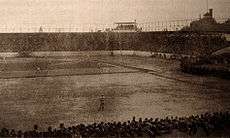Columbia Park
|
Columbia Park in 1907. | |
| Location |
2900 Cecil B. Moore Avenue Philadelphia, Pennsylvania 19121 |
|---|---|
| Owner | Philadelphia Athletics |
| Capacity |
9,500 (1901) 13,600 (1905) |
| Field size |
Left Field – 340 ft Left Center – 392 ft Deep Left Center – 440 ft Center Field – 396 ft Right Center – 323 ft Right Field – 280 ft |
| Surface | Grass |
| Construction | |
| Broke ground | 1900 |
| Opened | April 26, 1901 |
| Closed | October 3, 1908 |
| Demolished | 1912 |
| Construction cost |
US$35,000 ($997 thousand in 2016 dollars[1]) |
| Tenants | |
|
Philadelphia Athletics (MLB) (1901–1908) Philadelphia Giants (Independent) (1902–1908) Philadelphia Phillies (MLB) (August 20-September 10, 1903) Philadelphia Athletics (NFL) (1902) | |
Columbia Park or Columbia Avenue Grounds was a baseball park in Philadelphia. It was built in 1901 as the first home of the Philadelphia Athletics, who played there for eight seasons, including two games of the 1905 World Series.
Columbia Park fell into disuse after the Athletics' move in 1909 to the larger Shibe Park, and was demolished in the 1910s.
Home of the Philadelphia Athletics
Columbia Park was built in 1901 by the Philadelphia Athletics when the team was established, in the creation of the American League. The site was a vacant lot on which manager and part-owner Connie Mack obtained a ten-year lease.[2] It occupied the block bordered by 29th Street, Oxford Street, 30th Street, and Columbia Avenue (since renamed Cecil B. Moore Avenue, in honor of the civil rights leader). The cost of construction was $35,000.

The stadium was very small, and originally had a seating capacity of only 9,500. This was eventually increased to 13,600 by the addition of bleacher seating in the outfield. During some sold out games, unofficial additional seating could be found on top of the adjoining homes. There was only one dressing room, for the home team; visiting teams had to change at their hotels. Although the ballpark was in Philadelphia's Brewerytown section, beer sales were prohibited.
The opening game in Columbia Park was held on April 26, 1901, after the first two games were rained out. The Athletics played the Washington Senators in front of an overflow crowd of 10,524, with some fans standing on the outfield walls and the roofs of nearby houses. The Athletics lost 5-1, despite three hits by second baseman Nap Lajoie.[3]

World Series
During their tenure at Columbia Park, the Athletics won the American League pennant twice. The first time was in 1902, before the institution of the modern World Series. Three years later the Athletics won again and faced the New York Giants in the 1905 World Series.
The Giants won the series 4 games to 1. Games 1 and 3 were held at Columbia Park. Both were shutout victories for Giants future hall of famer Christy Mathewson.[4]
Other teams
The Athletics leased the ballpark to the independent Negro League club, the Philadelphia Giants. The Giants played at the ballpark while the Athletics were on the road. The Giants were the first club to play night baseball in Philadelphia when they played under portable lights on June 4, 1902.
The Philadelphia Phillies temporarily called Columbia Park home in 1903 while Baker Bowl was repaired after a balcony collapse on August 8, 1903.[5] The Phillies played sixteen games at Columbia Park in August and September 1903.[6]
The stadium also briefly served as the home of the Philadelphia Athletics football club, before the team folded in 1902.
Disuse and demolition
The final game played at the park took place on October 3, 1908; the visiting Boston Americans defeated the Athletics 5-0 in the second game of a doubleheader. The lack of seating at Columbia Park was the main reason the Athletics left for Shibe Park. The sod from Columbia Park was transplanted to Shibe Park after the 1908 season.[7]
After the Athletics left, the park was almost entirely abandoned. Columbia Park was eventually demolished in the 1910s to make way for new homes.
References
- ↑ Federal Reserve Bank of Minneapolis Community Development Project. "Consumer Price Index (estimate) 1800–". Federal Reserve Bank of Minneapolis. Retrieved October 21, 2016.
- ↑ Selter, Ronald M. (2008). Ballparks of the Deadball Era: A Comprehensive Study of their Dimensions, Configurations, and Effects on Batting, 1901 – 1919. Jefferson, North Carolina and London: McFarland & Company. p. 133. ISBN 978-0-7864-3561-6.
- ↑ "Carrick, All to the Good, Fools The Athletic Hitters". Philadelphia Inquirer. 27 April 1901.
- ↑ Ritter, Lawrence (1992). Lost Ballparks: A Celebration of Baseball's Legendary Fields. New York: Viking Studio Books. p. 178. ISBN 0140234225.
- ↑ Macht, Norman L.; Connie Mack, III (2007). Connie Mack and the Early Years of Baseball. University of Nebraska Press. p. 316. ISBN 0-8032-3263-2. Retrieved 2009-05-22.
- ↑ "Alternate Site Games Since 1901". Retrosheet. Retrieved 2009-05-22.
- ↑ Frommer, Harvey (2008). Shoeless Joe and Ragtime Baseball. University of Nebraska Press. p. 23. ISBN 0-8032-1862-1. Retrieved 2009-05-22.
External links
| Wikimedia Commons has media related to Columbia Park. |
- PhiladelphiaAthletics.org: Columbia Park was the first home of the Athletics
- Ballparks.com: Columbia Park
| Preceded by first ballpark |
Home of the Philadelphia Athletics 1901 – 1908 |
Succeeded by Shibe Park |
Coordinates: 39°58′52″N 75°10′58″W / 39.98111°N 75.18278°W
